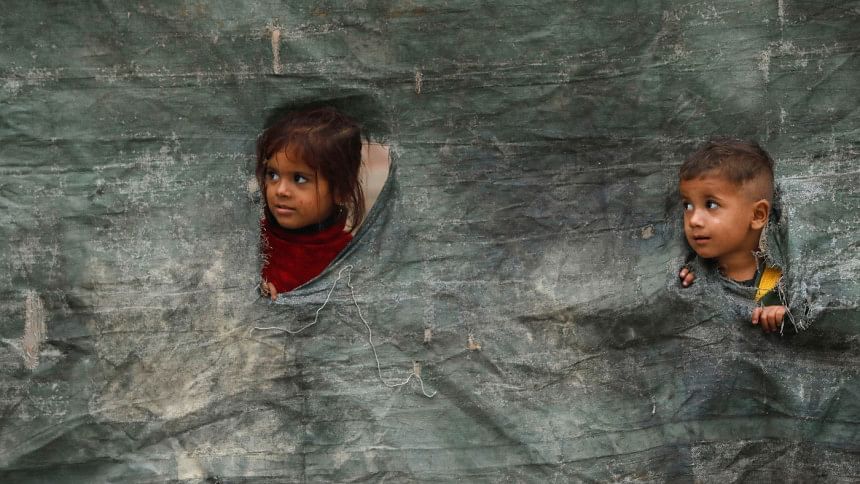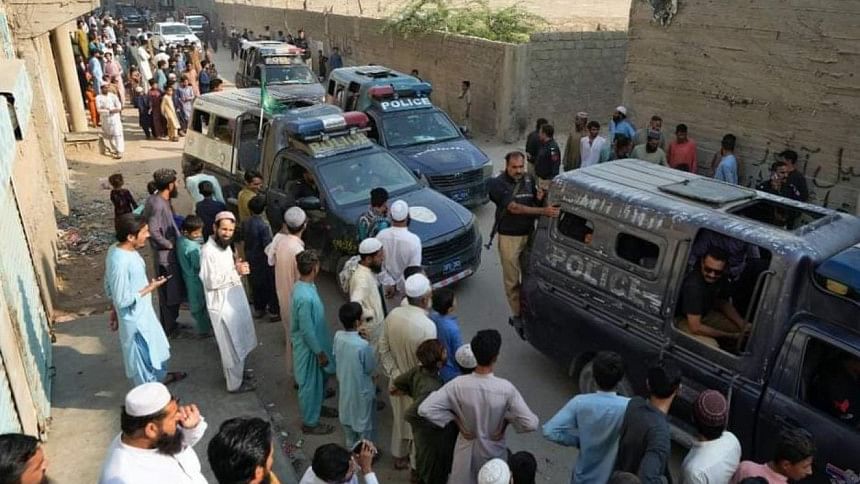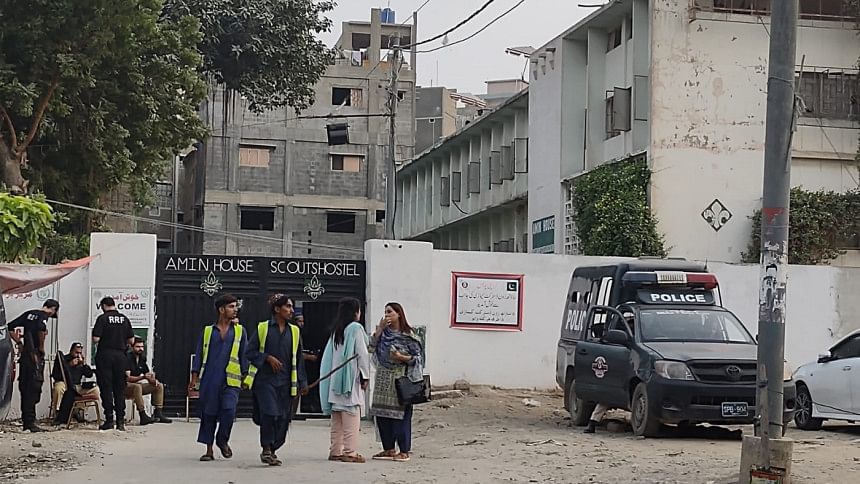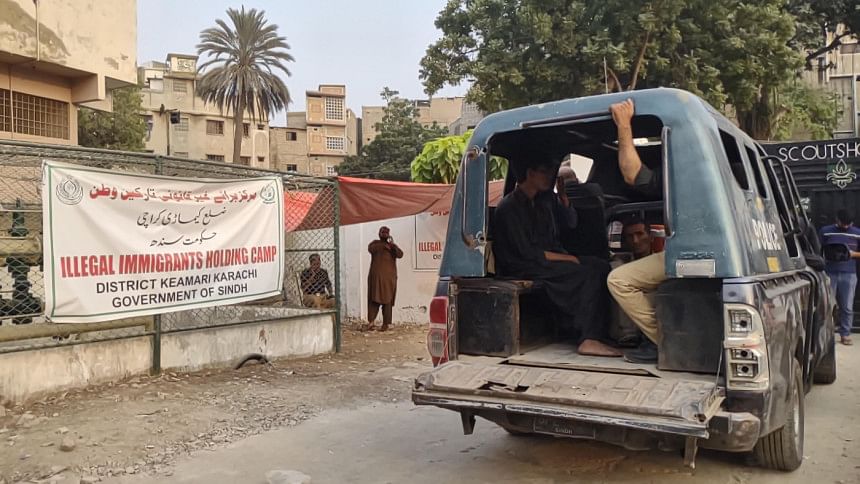Why are Afghan families being forced to deport from Pakistan?

Sweaty, stomachs empty, and eyes heavy with exhaustion, Abdul Majid searches for his wife, Afsun Bibi, and their two-month-old infant in the city's police stations and Afghan detention centre at Sultanabad.
"At 3am on the night of October 3, my family and I were sleeping when suddenly a heavy police force entered my house. For a moment, I could not understand what was happening," says Abdul Majid.
According to the 27-year-old, the police (all men) woke up his wife by grabbing her head, and started asking for their Proof of Registration (POR) cards—cards denoting Afghan origin issued by the UNHCR, under permission from the Government of Pakistan.
Abdul Majid had his card, but his wife's one was at her parents' house. The police detained Afsun Bibi and their two-month-old son.
"I have been looking for my wife and two-month-old baby since then. When I go to the police station, the police say that my wife has been transferred to the detention centre [at Sultanabad], but when I came here, the official [of the detention centre] told me that my wife and child are not here."
Like many other Afghan refugees who have lived in the country for nearly four decades, Abdul Majid is asking how Pakistan can force them out within 30 days—the deadline given by Caretaker Interior Minister Sarfraz Bugti.
"It was no less than a shock for me. I was born in Pakistan. My father came to Karachi from Kabul in 1992. We have been living in Karachi for 31 years," he said.
"Many Afghan refugees have been living in Pakistan for decades. Many of them are born here. For them, this is the only home they know—and their only chance of survival," according to the Joint Action Committee for Refugees.
Why now?
The caretaker government in Pakistan claims that the recent surge in violence has been caused by undocumented Afghan refugees. "Caretaker government" is an important framework to remember, says Saeed Husain, an anthropologist and human rights activist from Karachi. "Pakistan's elections are supposed to be held this year...a caretaker setup backed by Pakistan's military—which is not supposed to exist beyond mid-November has taken xenophobic and unconstitutional steps against all Afghan refugees residing in the country," Husain adds.

Pakistan's military which has historically received high approval ratings from citizens, faced dramatic backlash after former PM Imran Khan's arrest. With a failing currency and rapid inflation, economic anxieties have crept into the vast majority of households in Pakistan. The caretaker government blames the migrants and refugees for the shambolic state of affairs in Pakistan, according to experts.
"Targeting Afghan refugees remains the easiest target. Propaganda from British Raj-era depictions of Pashtuns to a curated contemporary media vitriol type-setting Afghan refugees as largely responsible to crimes in Pakistan, makes it easy to garner public support in dehumanising Afghan lives and placing a smokescreen on the structural issues in the country," says Hussain.
As such, on October 2, the caretaker government gave foreigners without any legal paperwork until November 1 to leave the country. The refugees who fail to leave by then, will be subjected to raids and placed in detention centres. Pakistan's Interior Minister Sarfaraz Bugti has expressed how they will remove all Afghan refugees living in the country, whether they have government issued documents or not.
However, many politicians and civil society and human rights organisations have condemned the caretaker government's decision, saying it is unfairly targeting vulnerable Afghan citizens. Many, like Abdul Majid, have been threatened with deportation despite having government-issued identity documentation.

Pakistan has hosted millions of Afghan refugees since the Soviet Union invaded Afghanistan in 1979. The last major wave of refugees came in August 2021 when the Taliban returned to power in Afghanistan, forcing another 600,000-800,000 Afghan citizens to flee to Pakistan, seeking asylum.
"Pakistan has a shameful part to play in destabilising Afghanistan, because of which Afghan people have no choice but to flee to neighbouring countries likes ours, becoming refugees," according to Joint Action Committee for Refugees.
The caretaker government of Pakistan has continued to deny targeting the citizens of any country. Members of the caretaker government reiterate that this decision has been made for the welfare and security of the citizens of Pakistan.
Targeting children
Abdul Majid, who has worked as a labourer in Karachi for more than 17 years, alleges that the caretaker government and the interior minister were reneging on promises to deport undocumented migrants.
The caretaker government issued a notification on October 10, which said that Afghan refugees who have POR or Afghan Citizen Cards (ACC) can stay in Pakistan temporarily.
The United Nations High Commissioner for Refugees issued a report on October 3 expressing deep concern for the safety and well-being of children and families affected by the illegal alien repatriation plan. Afghanistan is in the grip of a humanitarian crisis, with ongoing human rights challenges and a severe winter on the horizon. About 30 million people are in need of humanitarian assistance and 3.3 million are internally displaced.

According to one estimate, more than 160,000 Afghans have left Pakistan since September 15. Of these, 86 percent of families cited fear of arrest as the most common reason for leaving in a hurry and without help.
"How many times will I have to go from one country to another for the protection of my family? I could not educate my children properly and now, when I want to go back, my 15-year-old innocent child cannot be found," asks Sher Azam Khan, another Afghan refugee.
The 39-year-old said that he had been searching for his child for the past 24 hours. When he did not come home from school, Sher Azam found out from the school management that the police had come and taken his son away.
"When I went to the police station, they said that they had sent him to the detention centre. Instead of listening to me, they are threatening to arrest me," Sher Azam says.
Sher Azam was born in Mazar-e-Sharif and, three decades ago, came empty-handed to Pakistan during the Soviet invasion of Afghanistan. Now, he says that he is leaving empty-handed again. He is afraid of the future his children may face in Afghanistan.
Moniza Kakar, a human rights and refugee advocate in Karachi, says, "In the recent large-scale forced deportation policy, they are especially targeting the children of Afghan refugees. Sindh Police has collected data of Afghan students in government schools and colleges. This is alarming as they are also arresting migrant children from schools and madrasas."
"Law enforcement seems to be following a strategy of detaining some family members in a bid to pressure other family members to also surrender themselves," argues Hossain.
He adds that unaccompanied children are being detained and put on buses destined for Afghanistan, while their parents and the rest of their family are in Karachi.
Several Afghan refugees like Abdul Majid and Sher Azam are currently looking for their families and children after police raids in different areas of Karachi. But the police and administration are not telling them where their loved ones are. The series of arrests continues, creating a dire situation of basic human rights in Pakistan.
"Like all human beings, Afghan refugees also deserve the right to life, liberty, and property, and any attempts by those in power to squash them will only weaken Pakistan's international position, along with further disillusioning the people of Pakistan," stated Joint Action Committee for Refugees calling for an immediate stop of the illegal deportation of Afghan refugees.
Faisal Rehman is a Pakistani journalist based in Karachi, Pakistan. He covers environmental issues and refugee crises. His X account is @journorehman
We welcome your contributions and analysis of global events. To submit articles to our new page, Geopolitical Insights, please send us an email at [email protected] or [email protected]
Follow The Daily Star Opinion on Facebook for the latest opinions, commentaries and analyses by experts and professionals. To contribute your article or letter to The Daily Star Opinion, see our guidelines for submission.

 For all latest news, follow The Daily Star's Google News channel.
For all latest news, follow The Daily Star's Google News channel. 




Comments